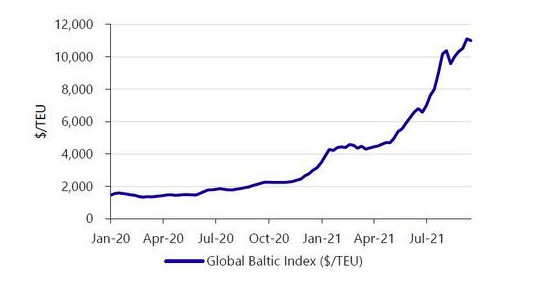There’s a lot more to the disruption of supply chains than a shortage of lorry drivers. Road transport is just the last link in the global economy whose real backbone is sea freight.
The media might be focused on other issues, but by far the biggest logistics problem right now is the disruption of the global shipping industry.
ZeroHedge has published a must-read briefing on the issue by Michael Every and Matteo Iagatti of Rabobank. It’s long, but digestible.
Here’s the key chart — the soaring cost of transporting goods by sea:

In case you were wondering, “TEU” stands for Twenty-foot Equivalent Unit — the units in which cargo capacity is measured. It refers to the length of a standard shipping container.
The Ever Given — the ship that got stuck in the Suez Canal back in March — had a capacity of 20,000 TEUs. It delayed the passage of hundreds other ships. The knock-on effects are still working their way through the system. However, the problems of the shipping industry can’t be blamed on that incident alone.
Ultra-large Container Vessels (ULCVs) like the Ever Given are now so big that they’re causing problems everywhere, not just in the close confines of the Suez Canal. It’s an issue that the authors call “Too Big to Sail”. In most circumstances, that’s not literally true — but the mega-ships do require high specialised port facilities and as a result they have forced a “hub-and-spokes” shape to supply chains.
Therefore if anything happens to the hubs — for instance the port disruption in China caused by Covid and now by power shortages — then that disrupts the entire system. As Every and Iagatti point out, this is “the antithesis of a nimble, distributed, flexible, resilient system, and actually help[s] create and exacerbate the cascading supply-chain failures we are currently experiencing.”







Join the discussion
Join like minded readers that support our journalism by becoming a paid subscriber
To join the discussion in the comments, become a paid subscriber.
Join like minded readers that support our journalism, read unlimited articles and enjoy other subscriber-only benefits.
SubscribeVague assertions like being “forced to counter the influence” are a common sign of someone working backwards from a conclusion they want (maybe not Unherd in this case but the ZH authors).
Governments have proven that their abilities to run things are extremely poor. That’s the whole reason the global supply chain is staggering around like it’s just been punched in the face repeatedly. It has been! The last thing we need is the very same geniuses who wrecked the system in the first place to attempt a top-down “redesign” of it.
The thing is, the so-called over-optimization of shipping was absolutely fine until governments went crazy and started randomly shutting down factories and ports. The Ever Given wasn’t enough to cause shipping rates to spiral like that and COVID has never been disruptive enough by itself to even come close to being a supply chain crisis; that’s all on us humans.
Moreover this was a “crisis” that appears to have been manufactured by government’s own staff of virologists, helped along by communist-envying epidemiologists and other public health tinpot dictators. It is impossible for any organization to make itself resilient to mass hysteria and groupthink on the scale witnessed in the last two years. The potential for completely random and illogical interference is unlimited, which is the definition of an un-mitigatable risk.
No, what governments should do is simple: stop doing things.
The final argument is one I have seen getting made in a number of different ways concerning the Chinese statist model: We may not want to do it, but if China is doing it, we might have to.
The argument’s been applied to subsidies for ‘our’ companies, to more aggressive trade policy in Africa, even to social credit scoring and COVID lockdown-ism.
For me, the argument depends on an inherent scepticism of the value of free societies and free markets. We seem to have forgotten that the West’s reliance on free markets is about more than just belief. It is about the observation that when people and businesses are allowed to organise without top-down interference, they deliver better outcomes – better decision-making, less conflict and better products and services. This is why the West won the 20th Century.
Why should we believe this will not hold true in the 21st Century? What secrets recipe have the Chinese discovered that will allow them to build prosperity while maintaining state control? Is the CCP not, in reality, far more fragile than we give it credit for?
Sooooo…
Looks like we will need to refuse to use the “too big” ships that are causing the problem.
If this is the best UnHerd staff can do they should give up. Nothing in this article outlines why smaller ships would have avoided the current problems. Covid and electrical shortages hit big and small ports alike. How would more small ports alleviate staff shortages? Or create more truck drivers. The hub and spoke model became predominant because it moved the most goods the cheapest. That will be true again.
I thought he meant that more ports would at least remove the single point of failure ie the hubs
Global supply chains rely on plenty of cheap land, labour & transport. To think that would last forever is pretty dim!
“Over-optimization that works well in ideal conditions, but not in times of disruption” is what the Corporate State calls “efficiency” and Nissan Taleb calls “fragility.” One of the worst example is airlines, whose system must work perfectly or fail utterly.
I read more. Once I saw the words “hub and spoke” I knew what the problem was going to be.